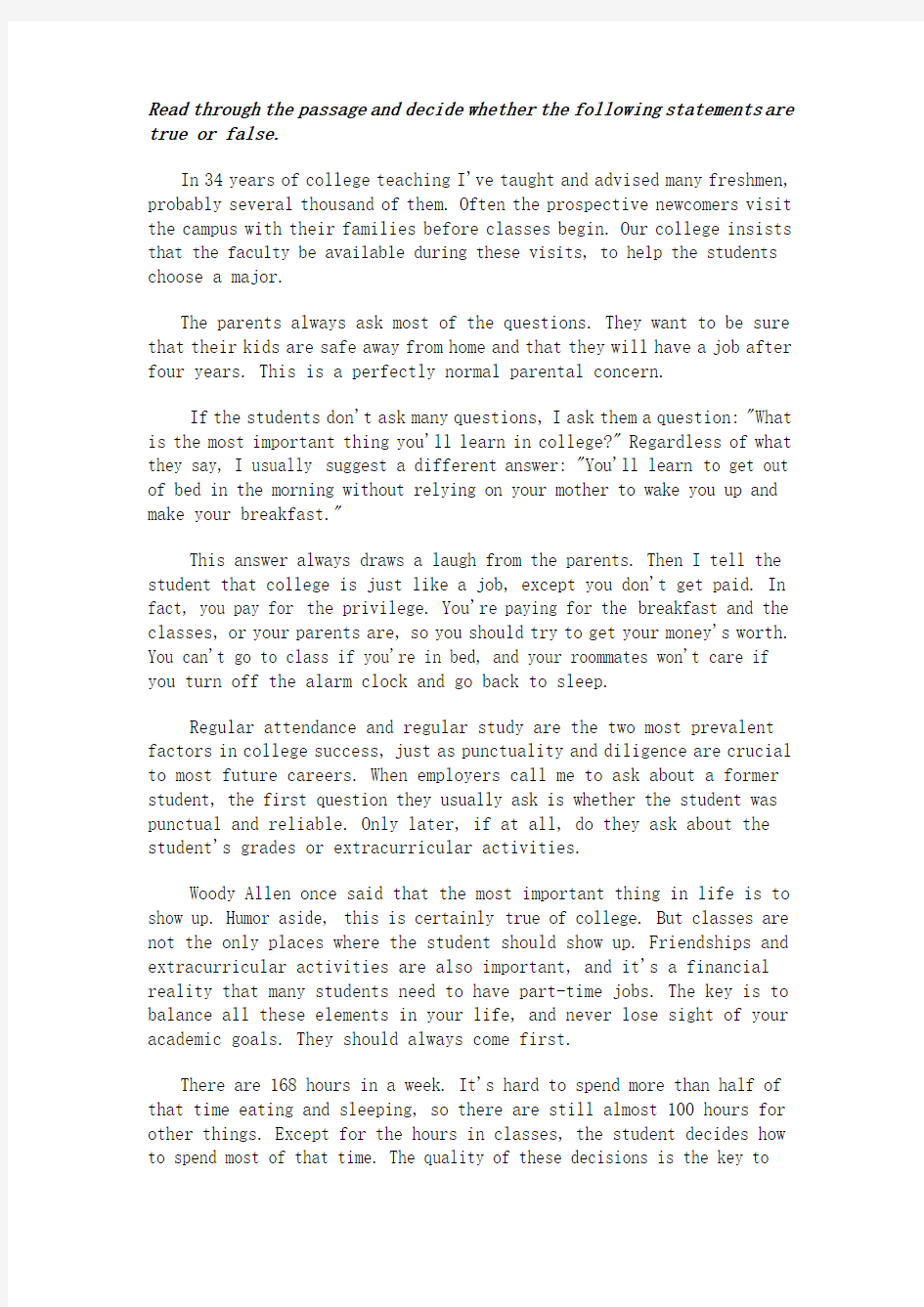华中科技大学网络教育英语附答案

- 1、下载文档前请自行甄别文档内容的完整性,平台不提供额外的编辑、内容补充、找答案等附加服务。
- 2、"仅部分预览"的文档,不可在线预览部分如存在完整性等问题,可反馈申请退款(可完整预览的文档不适用该条件!)。
- 3、如文档侵犯您的权益,请联系客服反馈,我们会尽快为您处理(人工客服工作时间:9:00-18:30)。
Read through the passage and decide whether the following statements are true or false.
In 34 years of college teaching I've taught and advised many freshmen, probably several thousand of them. Often the prospective newcomers visit the campus with their families before classes begin. Our college insists that the faculty be available during these visits, to help the students choose a major.
The parents always ask most of the questions. They want to be sure that their kids are safe away from home and that they will have a job after four years. This is a perfectly normal parental concern.
If the students don't ask many questions, I ask them a question: "What is the most important thing you'll learn in college?" Regardless of what they say, I usually suggest a different answer: "You'll learn to get out of bed in the morning without relying on your mother to wake you up and make your breakfast."
This answer always draws a laugh from the parents. Then I tell the student that college is just like a job, except you don't get paid. In fact, you pay for the privilege. You're paying for the breakfast and the classes, or your parents are, so you should try to get your money's worth. You can't go to class if you're in bed, and your roommates won't care if you turn off the alarm clock and go back to sleep.
Regular attendance and regular study are the two most prevalent factors in college success, just as punctuality and diligence are crucial to most future careers. When employers call me to ask about a former student, the first question they usually ask is whether the student was punctual and reliable. Only later, if at all, do they ask about the student's grades or extracurricular activities.
Woody Allen once said that the most important thing in life is to show up. Humor aside, this is certainly true of college. But classes are not the only places where the student should show up. Friendships and extracurricular activities are also important, and it's a financial reality that many students need to have part-time jobs. The key is to balance all these elements in your life, and never lose sight of your academic goals. They should always come first.
There are 168 hours in a week. It's hard to spend more than half of that time eating and sleeping, so there are still almost 100 hours for other things. Except for the hours in classes, the student decides how to spend most of that time. The quality of these decisions is the key to
the college experience. Students with bad habits or irresponsible friends often let those habits or friends make the decisions for them.
This doesn't mean that college is no fun. In fact it's lots of fun if you learn to balance work and pleasure, or even to mix them together. There's plenty of time for both. But not if you stay in bed until noon, miss your breakfast, and miss your morning classes. Then you'll spend the rest of the day trying to catch up, borrowing classmates' notes, and eating unhealthy snack food. Your mother would be very angry!
1.The author compares college experience to a long holiday.
2.According to the passage, teachers will care most about whether
a student gets out of bed in the morning.
3.Academic achievements are the employers’first concern when they
choose students as their prospective employees.
4.The author’s purpose in mentioning the student’s breakfast
several times in the passage is to give an example that the students should be punctual and diligent.
5.The author describes college life in a humorous and persuasive
manner.
6.The author believes academic goals are the most important, but
there should be a balance with other goals.
7.The author suggests that students make good decisions and use time
wisely in order to enjoy all aspects of college experience.
8.The author implies that life in college can be boring if students
cannot balance work and pleasure.
答案:
1.F
2.F
3.F
4.T
5.T
6.T
7.T
8.F
